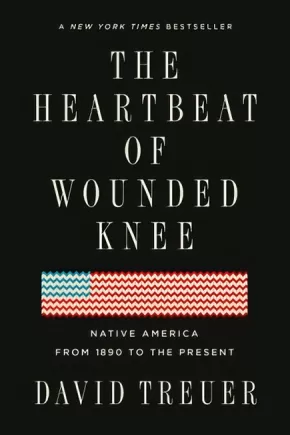David Treuer
David Treuer is Ojibwe from the Leech Lake Reservation in northern Minnesota. The author of four previous novels, most recently Prudence, and two books of nonfiction, he has also written for The New York Times, Los Angeles Times, Esquire, Slate, and The Washington Post, among others. He has a Ph.D. in anthropology and teaches literature and creative writing at the University of Southern California.
Books (1)
Synopsis:
"Chapter after chapter, it's like one shattered myth after another." - NPR
A New York Times bestseller: The sweeping history–and counter-narrative–of Native American life from the Wounded Knee massacre to the present.
The received idea of Native American history–as promulgated by books like Dee Brown’s mega-bestselling 1970 Bury My Heart at Wounded Knee–has been that it essentially ended with the 1890 massacre at Wounded Knee. Not only did one hundred fifty Sioux die at the hands of the U. S. Cavalry, the sense was, but Native civilization did as well. Growing up Ojibwe on a reservation in Minnesota, training as an anthropologist, and researching Native life past and present for his nonfiction and novels, David Treuer has uncovered a different narrative, one of unprecedented resourcefulness and reinvention.
Melding history with reportage and memoir, Treuer traces the tribes’ distinctive cultures from first contact, exploring how the depredations of each era spawned new modes of survival. The devastating seizures of land gave rise to sophisticated legal and political maneuvering that put the lie to the myth that Indians don’t know or care about property. The forced assimilation of their children at government-run boarding schools incubated a unifying Native identity. Conscription in the US military and the pull of urban life brought Indians into the mainstream, even as it steered the emerging shape of self-rule and spawned a new generation of resistance. The Heartbeat of Wounded Knee is the essential, intimate story of a resilient people in a transformative era.
Reviews
“An informed, moving and kaleidoscopic portrait of ‘Indian survival, resilience, adaptability, pride and place in modern life.’ Rarely has a single volume in Native American history attempted such comprehensiveness . . . Ultimately, Treuer’s powerful book suggests the need for soul-searching about the meanings of American history and the stories we tell ourselves about this nation’s past.” —New York Times Book Review
“In a marvel of research and storytelling, an Ojibwe writer traces the dawning of a new resistance movement born of deep pride and a reverence for tradition. Treuer’s chronicle of rebellion and resilience is a manifesto and rallying cry.” —O, The Oprah Magazine
“Treuer is an easy companion: thoughtful, provocative and challenging. He tells a disturbing yet heroic story that may very well be seen as a definition of ‘American exceptionalism.’” —Washington Post
“Sweeping, essential history...Treuer’s storytelling skills shine...[an] elegant handling of [a] complex narrative.” —The Economist
“Treuer provides a sweeping account of how the trope of the vanishing Indian has distorted our current understanding of Native peoples. Instead of seeing Wounded Knee as the final chapter, he recovers the importance of World War II, urban migration, casinos, and the computer age in reshaping the modern Native American experience. The Heartbeat of Wounded Knee is written with conviction and illuminates the past in a deeply compelling way.” —Nancy Isenberg, author of White Trash: The 400-Year Untold History of Class in America
“An ambitious, gripping, and elegantly written synthesis that is much more than the sum of its excellent parts—which include a rich array of Native lives, Treuer’s own family and tribe among them--The Heartbeat of Wounded Knee brings a recognition of indigenous vitality and futurity to a century of modern Indian history.” —Philip J. Deloria, Professor of History, Harvard University
Additional Information
528 pages | 5.50" x 8.25" | 11 maps and photos throughout






